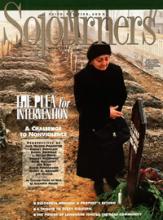At first blush it seems that Somalia is presenting the peace movement with a new question: Now that the Cold War is over and the superpowers are not jealously protecting territories, should military force be used to respond to humanitarian crises? But that is the wrong question. When the question is phrased in this way, two elements distract us from the truth.
When the situation in Somalia is linked with the end of the Cold War, reality is distorted. The violence and chaos in Somalia is not happening because the Cold War is over. It's happening as a direct result of the Cold War, which provided the ideological base for the arms buildup and the militarization that are the problems in Somalia.
There was a drought, but the people in Somalia would not be facing starvation today if it were not for the arms race that poured weapons into a country that paid for them with cash crops for export instead of growing food for people. The "warlords" that are described as the problem were empowered by the weapons they acquired and the superpowers that supplied the weapons.
Phrasing the question in terms of the end of the Cold War can lull us into complacency, allowing us to think only of the cleanup needed now that the Cold War is over. The end of the Cold War removed the ideology for the arms race but did not end the arms race. Weapons sales grow at an alarming speed as the ongoing militarization of the planet sows the seeds of future wars.
A truer question would be: What is our responsibility when our nation has sold the weapons and propped up oppressive dictators and the situation is now out of control? What do we do with the violent militarized world that the Cold War built?
Read the Full Article

